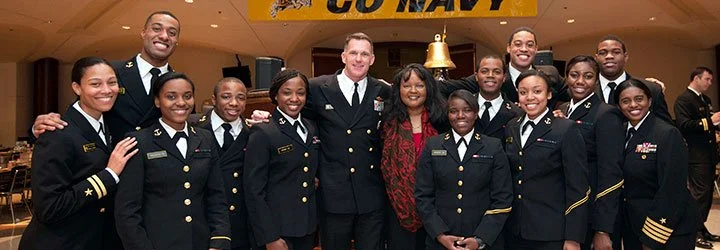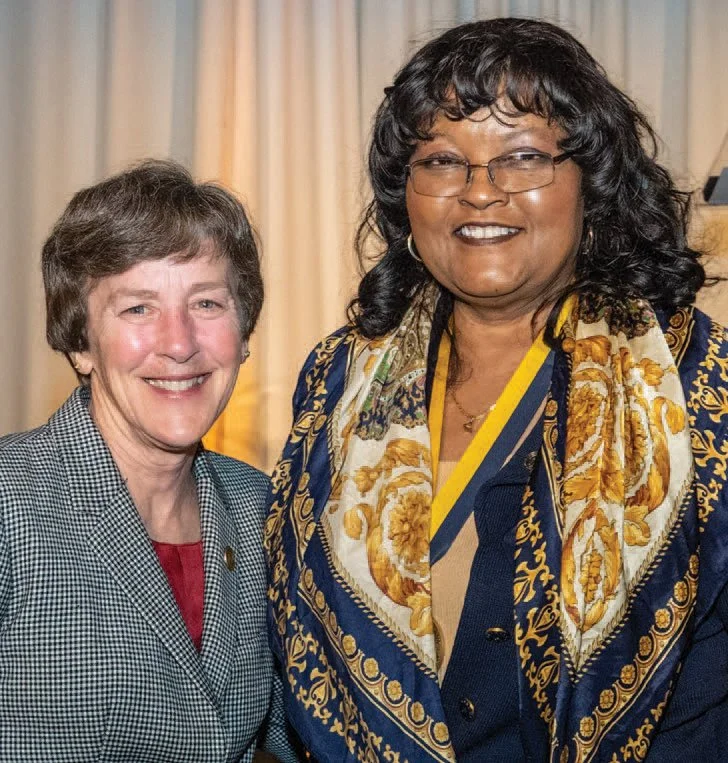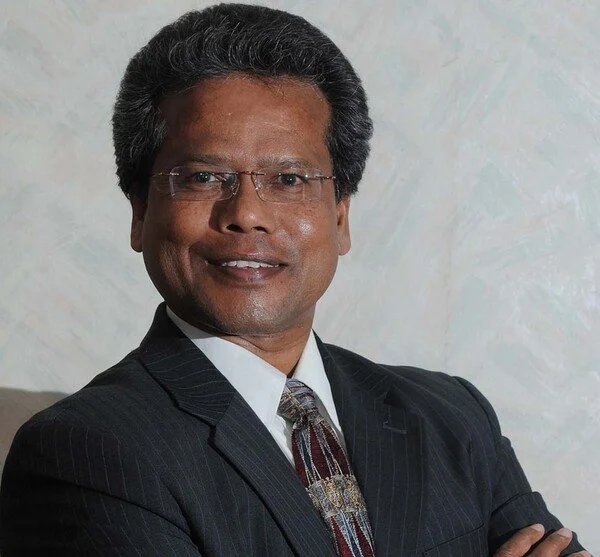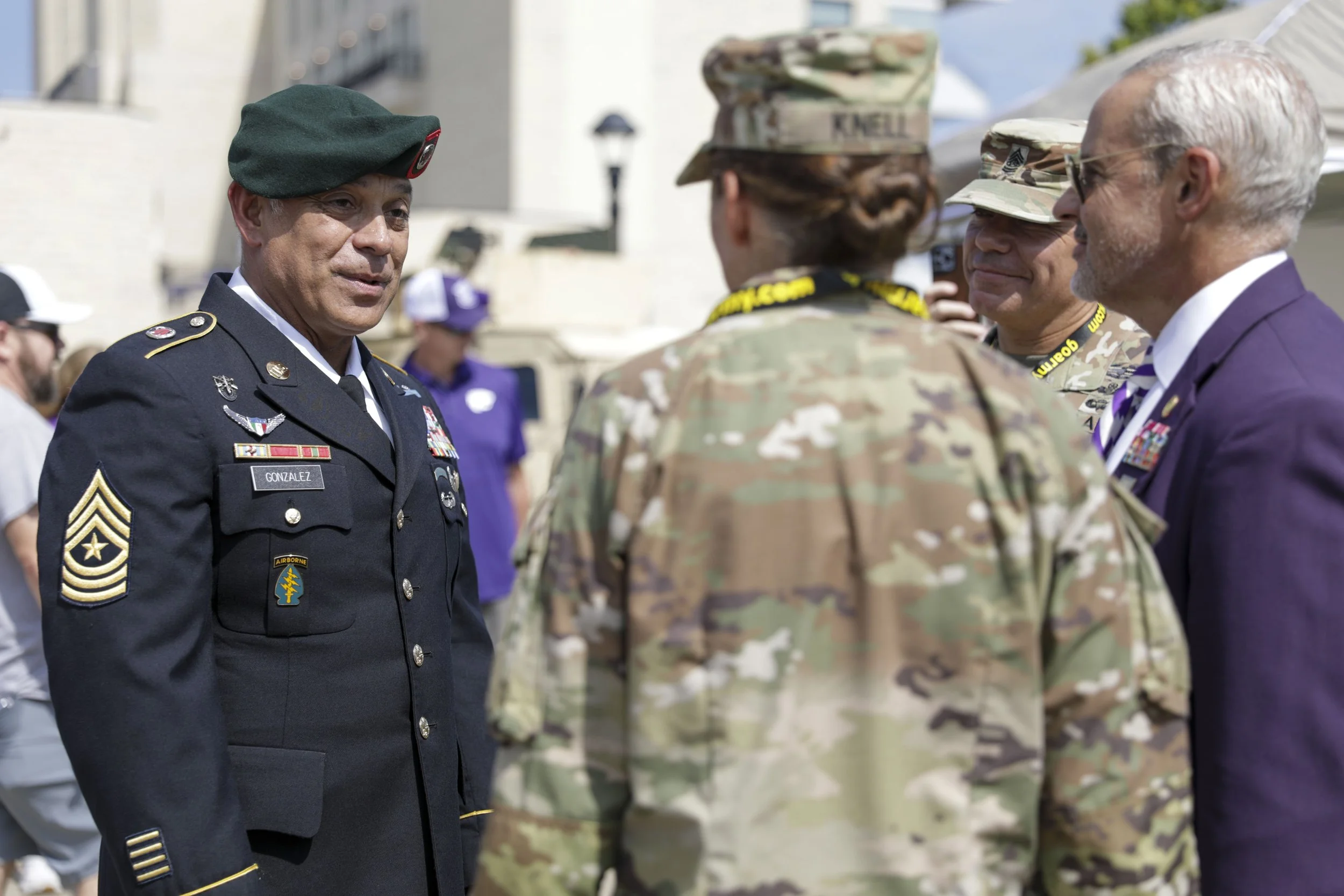Janie L. Mines blazed a trail for future women of color at the Academy
Four years at the Naval Academy tests the mettle of many midshipmen. For Janie L. Mines ’80 some days on the Yard were downright harrowing.
Dauntless, she persevered to become the first Black woman to graduate from the Academy. It’s a subject she speaks about openly in her book, No Coincidences, where she reflects on the faith-centered upbringing that prepared her not only to endure trying circumstances, but to excel in spite of obstacles and to lead the way for the others who would follow.
“If being the first Black woman to graduate was my only legacy at the Academy, then I’d be kind of ashamed of myself,” Mines said. “But there is a responsibility that goes along with my experience. When I meet with midshipmen, they’ll tell me, ‘You started this. People came behind you because you opened the door and didn’t quit.’”
Raised in Aiken, SC, Mines is the daughter of a Baptist minister and a teacher who supported her in every endeavor. She admits to having “a bit of an anger management problem as a little girl,” so when an older cousin encouraged her to pursue martial arts, she joined an all-male, mostly white combat dojo.
“Imagine a 90-pound girl competing against grown men. I’m surprised my parents let me do that,” Mines said. “But that experience became a true blessing for me growing up and aided my transition to the Academy because training in martial arts is not only about the techniques and athleticism. It also teaches obedience, develops character and sets expectations.”
Mines was fortunate to be accepted and receive scholarships to every Ivy League school she applied to. As an executive officer in JROTC with stellar academics, she caught the attention of a Blue and Gold Officer who encouraged her to apply to be part of the first class of women admitted to the Naval Academy.
Janie L. Mines was the first Black woman to attend and graduate from the U.S. Naval Academy.
She learned about the Academy’s reputation for outstanding academic rigor. The opportunities for leadership development and the prospect of serving her country were compelling. It felt like the Academy offered everything Mines hoped for in a college experience. She applied and was accepted, but still had not made the commitment to attend when she received a call from admissions.
“They said, ‘You’re going to be the only one. Are you coming?’ and I asked, ‘The only what?’ When I realized I would be the only Black woman at the Academy, everything clicked,” Mines said.
“All the experiences I had throughout my childhood where I was first and only, they were preparing me for this. It felt like something I was supposed to do.”
When Mines reflects on her time at the Academy, she views it through a historical lens. It took an act of Congress to permit the admission of women to the nation’s military academies. When the Naval Academy inducted 81 women (about 6 percent of the plebe class) in July 1976, it represented a milestone for the storied institution. Black men comprised around 3 percent of the Brigade.
“At the time, Black men were having a very difficult time leading in a predominantly white Navy,” Mines said. “They had only recently stopped being relegated to stewards and cooks, so the Academy was already dealing with that. Then you add women to the mix. I was told all I would do is get good white men killed and they couldn’t permit me to do that. My brothers can be very doggedly determined when they deem something is a threat to the mission of the Navy.”
Mines credits her father for raising her to understand that peoples’ biases are formed by their personal experiences. She realized that many in the Brigade likely hadn’t spent much time around a Black woman. She needed to prove to them that she was capable.
“If I made it about race and gender, I would not have graduated,” Mines said. “My goal was to show them how I could be an asset; how I could contribute to the mission and not be a detriment. I just had to survive the gauntlet that was placed before me in order to do that.”
Mentor to Many
After fulfilling her military service commitments as a supply corps officer, Mines chose not to pursue a career in the Navy.
“My detailer offered me different incentives to try to keep me in,” Mines said. “I told him it was time for me to go and he said, ‘You think you’re leaving, but you’ll never leave us.’”
Mines went on to earn her MBA from the Massachusetts Institute of Technology and enjoy a rewarding career in the corporate world, serving as senior vice president at Bank of America and Academy Securities. She also held management positions at Procter & Gamble, Frito-Lay and Hershey. And, she remained connected to the Navy, serving as a Highly Qualified Expert, Senior Executive Services on the staff of the Office of the Secretary of the Navy (2007-2009) and as a member of the Secretary of Defense, Defense Advisory Committee on Women in the Services (2016-2020).
2019 Naval Academy Distinguished Graduate CAPT Wendy B. Lawrence ’81, USN (Ret.), meets with 2021 Distinguished Graduate award recipient Janie L. Mines ’80 on 25 March. Photo by Laura Hatcher, laurahatcherphotography.com.
Admiral Patrick Walsh ’77, USN (Ret.), met Mines at the Academy when she was a plebe and he was a firstie. Their companies were in the same vicinity, so the two shared the same corridor in Bancroft Hall and became friends. Years later, when Walsh was vice chief of naval operations and Mines was advising the Office of the Secretary of the Navy, the two found themselves sharing a corridor again, this time at the Pentagon.
“All of us arrive at the Naval Academy with such different life experiences and perspectives and have to find a way to work together,” Walsh said. “After graduation, we found ourselves thrust again into unexpected situations, working with a team we had never met. But the core mission does not change, and along with it, the key qualities demanded among people do not change. Janie exemplifies this spirit. She looks at the world and sees that despite its challenges, there are far more things we share in common than what separates us.
“She is a leader who found a way to stay resilient, strong, positive and a contributing member of the Academy throughout her personal and professional career. And she selflessly shares those qualities as a mentor for the people whose lives she touches.”
Mines founded and directed the nonprofit Boyz to Men club in Fort Mill, SC, which provided support and guidance for socioeconomically disadvantaged adolescents. Though she’s directly impacted hundreds of lives, she’s most proud of her son, William.
“He’s humbled me in ways that no one else ever could,” she said.
For decades, Mines has served as an informal mentor to midshipmen and junior officers who ask for her advice.
“I’ve taken a lot of phone calls in the middle of the night,” Mines said.
She now serves on the Naval Academy Alumni Association Board of Trustees’ Ad Hoc Committee on Alumni Culture, Diversity and Inclusion where she remains dedicated to the mission of the Academy and its influence on the cultivation of young officers.
“My hope for the Academy’s future is that we live up to our full potential, not only as leaders in the military but in the nation,” Mines said. “That we serve as a beacon of all the things that are positive and good about our country and that we help to lead others back to our founding values. I know those are lofty goals, but it’s what I hope for.”
This story appeared in the May 2022 issue of Shipmate magazine.













